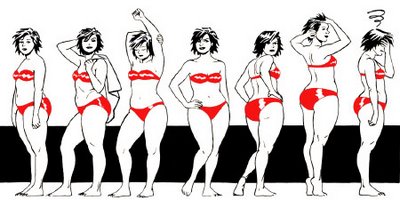"I was going crazy, locking myself in the bathroom, drawing women."

Many people are astonished by a heterosexual man's ability to draw lesbians, and women characters in general, so generously and accurately. When asked how he does it, Jaime Hernandez taps his foot against the floor-- an endearing nervous tic-- and says that, to him, his characters are always "people first."
Jaime was in Austin yesterday to kick off the fourth annual celebration of Latino culture, ¡A Viva Voz! He spoke to a few dozen new and old school fans at UT's Nettie Lee Benson Latin American Collection.
About Maggie, the character he's been drawing and following for 25 years, he says, "I wanted to create a female character I could do anything with: I could put her on Mars, I could put her on a ranch, I could make her a superhero."
Most readers love Love & Rockets for its versatility and its magical sense of storytelling, others because it holds up a mirror to them, and gives them a voice. This is appropriate, since it stemmed from a dearth of images or representations of Hoppers (Oxnard, CA, where Jaime is from) and punk rockers. Seeing early images of punks pulling blades on people in super-hero comics always prompted Jaime to think: "I never met a punk like that in my life." It made him want to draw them, represent them right.
 Jaime's influences include Dennis the Menace and random old comics, and he loved the dialogue, "the back and forth" between Alice and the caterpillar in Alice in Wonderland, which he re-read compulsively. But the comic which he declares had the most influence on him was Archie: "Every summer my mom would pull out a huge sack of Archie comics," he says, and mimics his mother carrying a sack. He says he hoped that Maggie and Hopey would someday be their own Betty and Veronica. At this, a few people cheer.
Jaime's influences include Dennis the Menace and random old comics, and he loved the dialogue, "the back and forth" between Alice and the caterpillar in Alice in Wonderland, which he re-read compulsively. But the comic which he declares had the most influence on him was Archie: "Every summer my mom would pull out a huge sack of Archie comics," he says, and mimics his mother carrying a sack. He says he hoped that Maggie and Hopey would someday be their own Betty and Veronica. At this, a few people cheer.He displays a keen sensitivity to his characters. He explains that the purpose of the 6 pages he added to "100 Rooms" was to clarify that Maggie hadn't been raped. He'd heard someone say something about Maggie's rape, and he freaked out, since he'd never intended her to be raped, or for anyone to think she was. After all the clarifications, he found out that the person who'd misconstrued the event as a rape was none other than his sister-in-law.
The only time a bookstore refused to carry L&R was when a drawing of a naked gay man appeared in its pages. "Of course-- we'd been showing naked lesbians for years," he says, and laughs. He says the more people become angry or raise eyebrows at his work, the more he wants to provoke them.
A female audience member mentions how happy she is that he'd "let Maggie get fat" over the years. He says he chose to do so because the more he drew her, the more he wanted to add curves, and the bigger he drew her, the more he liked her. He said she truly blossomed as a character ("No pun intended") when she expanded in size. And he tells us he got the most response from male readers: "they didn't want fat chicks in their comics." It was the only truly negative response he'd ever received, and it excited him, and, of course, made him want to keep going. And thank god for that.

0 Comments:
Post a Comment
<< Home